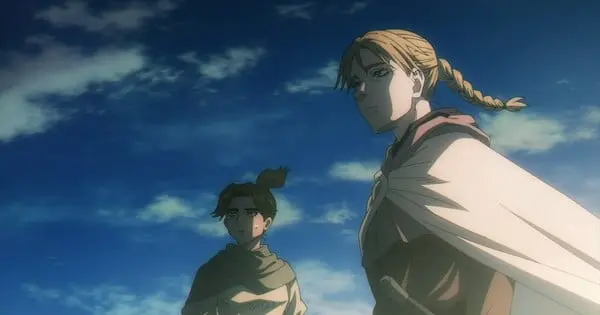Episode 19 of Orb: On the Movements of the Earth, titled “Morality Is Something You Find When You’re Lost,” deepens the exploration of the conflict between religious dogma and scientific inquiry in a 15th-century setting. The anime, adapted from Uoto’s manga, continues to weave a complex narrative around heresy, knowledge, and the human cost of challenging established power.
The Shifting Sands of Belief
Damian vs. Asch: A Clash of Ideologies
The episode highlights the growing tension within the Church itself. Bishop Damian and Inquisitor Asch find themselves at odds regarding the appropriate methods for dealing with heretics. Asch, embodying the traditional, brutal approach of the Inquisition, favors torture as a means of extracting confessions and suppressing dissenting ideas. Damian, however, advocates for a more moderate path, seeking to guide heretics back to the Church through kindness and understanding.
This ideological clash is rooted in Damian’s past experiences, hinting at a previous case that shaped his perspective. He reminds Asch of a time when moderation proved effective, recalling a “sorcerer” who ultimately became an Emperor after being treated with leniency. Asch, however, remains unconvinced, arguing that such methods have failed in the past and that the Church’s orthodoxy is now being questioned. He insists on the necessity of stopping heretics from spreading their dangerous ideas.
Nowak’s Crossroads
The ongoing crisis surrounding the stolen book further complicates matters. Asch seeks out Nowak, hoping to enlist his help in tracking down those responsible. Nowak, initially reluctant to become involved, is eventually spurred into action by his sense of duty. He urges Asch to focus on identifying anyone using the new printing technology, recognizing the potential for the rapid dissemination of heretical ideas.
The Seeds of Rebellion
Jolenta’s Vision
Jolenta, a former inquisitor’s daughter turned leader of the “Heresy Liberation Front,” emerges as a central figure in the fight for intellectual freedom. She shares the profound significance of Oczy’s book with Draka, conveying its power to challenge the Church’s authority and inspire critical thinking. Inspired by their conversation, Draka encourages Jolenta to write her own book, further fueling the flames of rebellion.
The Price of Progress
Orb doesn’t shy away from exploring the moral complexities of revolution. While Jolenta fights for science and freedom, her methods are not without their flaws. Draka draws a parallel between the HLF’s violence and zealotry and the Inquisition’s own tactics, prompting Jolenta to acknowledge the potential for even noble causes to be corrupted by human nature.
However, the anime subtly argues that Jolenta’s cause, despite its imperfections, represents a step in the right direction. Unlike the Church, which clings to rigid dogma, science embraces doubt, questioning, and revision. This inherent capacity for self-correction offers a path toward true intellectual liberation.
The Heliocentric Theory: A Spark of Truth
The Importance of Oczy’s Book
Oczy’s book holds immense significance within the narrative of Orb. It represents a tangible threat to the Church’s dominance, containing ideas that challenge the established geocentric worldview. The book’s contents likely detail the heliocentric theory, which posits that the Earth and other planets revolve around the Sun – a concept deemed heretical and punishable by death in the 15th century.
The Power of Printing
The emergence of printing technology plays a crucial role in the spread of these revolutionary ideas. The printing press allows for the mass production of books, making knowledge more accessible to the masses and circumventing the Church’s control over information. This technological advancement empowers individuals like Jolenta to disseminate heliocentric ideas and challenge the Church’s monopoly on truth.
Rafal’s Legacy
The foundation for this intellectual rebellion was laid by figures like Rafal, a brilliant young man who dared to question the Church’s teachings. Rafal’s story, as depicted in the earlier episodes, highlights the personal sacrifices and dangers associated with pursuing scientific truth in a time of religious oppression. His research, hidden away and later discovered, serves as a catalyst for the events unfolding in Episode 19.
Historical Context: The Real Scientific Revolution
The 15th Century and the Dawn of Discovery
Orb: On the Movements of the Earth is set against the backdrop of 15th-century Europe, a period of significant intellectual and cultural transformation. This era witnessed the rise of humanism, the rediscovery of classical knowledge, and the beginnings of the Scientific Revolution. The invention of the printing press by Johannes Gutenberg in the mid-15th century revolutionized the spread of information and paved the way for new ideas to challenge traditional authorities.
Copernicus and the Heliocentric Model
While the anime is set in the 15th century, the heliocentric theory is most famously associated with Nicolaus Copernicus, who published his groundbreaking work, De revolutionibus orbium coelestium (On the Revolutions of the Heavenly Spheres), in 1543. Copernicus’s model placed the Sun at the center of the universe, challenging the long-held geocentric view that had been accepted for centuries.
Galileo and the Conflict with the Church
The heliocentric theory gained further traction in the 17th century, thanks to the observations and advocacy of Galileo Galilei. Galileo’s use of the telescope provided compelling evidence in support of Copernicus’s model, but his outspoken defense of heliocentrism brought him into direct conflict with the Catholic Church. In 1633, Galileo was condemned as a heretic and forced to recant his views.
The Gradual Acceptance of Heliocentrism
Despite the Church’s opposition, the heliocentric theory gradually gained acceptance among scientists and intellectuals. Over time, further observations and theoretical advancements provided overwhelming evidence in its favor. Today, heliocentrism is a cornerstone of modern astronomy and our understanding of the universe.
The Enduring Relevance of ‘Orb’
The Importance of Critical Thinking
Orb: On the Movements of the Earth is not simply a historical drama; it is a powerful reminder of the importance of critical thinking, intellectual freedom, and the courage to challenge established beliefs. The anime encourages viewers to question authority, to seek out knowledge, and to engage in open and honest debate.
The Ongoing Struggle Between Faith and Reason
The conflict between faith and reason remains a relevant topic in contemporary society. While science has made remarkable progress in unraveling the mysteries of the universe, religious beliefs continue to play a significant role in many people’s lives. Orb reminds us that faith and reason need not be mutually exclusive; rather, they can coexist and enrich our understanding of the world.
The Dangers of Dogmatism
Orb also serves as a cautionary tale about the dangers of dogmatism and the suppression of dissenting voices. Throughout history, those who have challenged the status quo have often faced persecution and even death. The anime underscores the importance of protecting intellectual freedom and fostering a society where new ideas can be freely expressed and debated.
In conclusion, Episode 19 of Orb: On the Movements of the Earth continues to deliver a thought-provoking and visually stunning exploration of the clash between faith and science in a pivotal moment in history. By examining the struggles of individuals caught in the crossfire of these competing ideologies, the anime offers a timeless message about the importance of knowledge, freedom, and the pursuit of truth.









